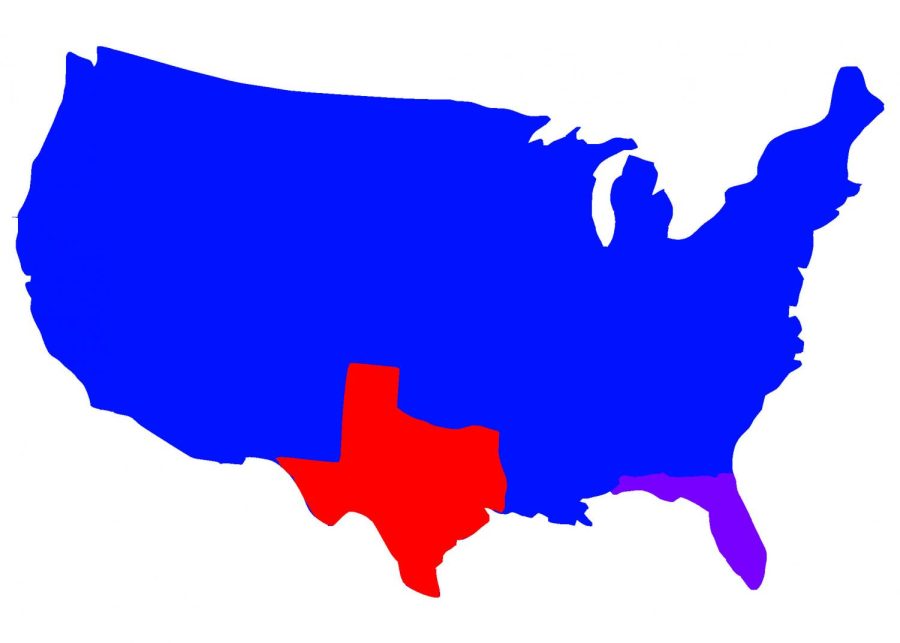The dire consequences of Texas’ new abortion law
Graphic illustration by Elizabeth Cheng
Texas’s decision to make the abortion law alienated the state from most of the country, but it’s also slowly influencing neighboring southern states.
October 6, 2021
Abortion as a right to bodily autonomy for women has been threatened by a recent law passed in Texas that nearly bans all abortion within the state. By using incentives to encourage people both in and out of the state, the law allows anyone to accuse and sue any abortion clinic or organization of workers in exchange for large monetary rewards. It also strictly forbids women from receiving safe and legal abortions after six weeks of pregnancy, with no exceptions for pregnancies resulting from rape or incest. Such an overt infringement on womens’ freedom of choice is blatantly unjust, and it sets a dangerous precedent for other conservative states, some of which are already in the process of creating similar laws.
Abortion is far from new in America and has been legalized for decades, having gained particular approval from the Supreme Court in 1973 as a liberty supported by the Constitution. However, Texas’s law proves that contention still exists over the controversial topic between people of certain groups — Democrats and Republicans in particular. Most Democrats are relatively accepting of abortion, recognizing its importance in emergencies and as a bodily right. Yet many conservative states such as Texas are against abortion, painting it as inhumane often due to religious beliefs. Within their arguments, though, there are several issues regarding violations of basic human rights.
Many of the people who argue against abortion are conservatives opposed to the concept of killing unborn babies, claiming that doing so is immoral and unlawful. Thus, they believe that removing abortion in its entirety would save lives and simply eradicate all moral issues. Many individuals who think in such conservative ways happen to be in positions of governmental power, which causes issues not because of their beliefs, which they are entitled to, but because they act upon them through the creation of problematic state laws.
“We have a lot of older, traditional people in positions of power with a lot of conservative thinking,” junior Vikram Thirumaran said. “Although they have the right to have their own opinion, people who think differently from them should also have their voices be heard. The law is not representative of the Texas population’s beliefs.”
The enforcement ultimately leaves women in Texas with extremely limited choices when it comes to getting abortions. It places a six-week cap on the time a pregnant woman can wait until the law impacts them, which is meaningless considering that many women can still be unaware of their pregnancies within such a short period of time. The law also proactively encourages citizens both in and out of state to sue any worker or organization performing any services remotely adjacent to abortion, appealing to the public through monetary rewards.
The 1973 Supreme Court approval of abortion as a liberty for women supported by our Constitution was resultant of the notorious Roe v. Wade court case. This landmark decision effectively stated that the government could not make excessive restrictions on abortion and its status as a right. However, Texas was able to evade this: Although governmental officials could not directly shut down all abortion clinics and services in the state, it could still be done so through citizens. Thanks to the nature of the abortion law, government officials are now able to eradicate the state of abortion services as they please, albeit indirectly, through citizens who are encouraged and influenced with bounties through successful lawsuits against any abortion service.
The consequences of this devastating new law have already begun to show. On Sept. 20, Texas doctor Alan Braid was sued after admitting to performing an abortion on a woman who was past the law’s six-week limit, even while fully aware of the consequences of such an action. He performed the abortion because he believed that it was part of his duty as a doctor to provide the necessary fundamental health-care that the woman needed. In response to his actions, however, two lawsuits were immediately filed, one by a felon in Arkansas who filed not because he was particularly against abortion, but merely because he wanted to acquire the bounty for a successful lawsuit. Such a ridiculous example of a lawsuit shows how dangerous it is to give every citizen the right to sue abortion doctors and clinics.
Although it is important that a woman consults others and carefully assesses her circumstances before making a decision, preventing her from getting an abortion is an infringement on her freedom of choice and bodily autonomy, something that a state does not have authority over. A full ban on abortion blatantly disregards any illegal and immoral conditions, such as rape or incest, that a woman may have endured to become pregnant, thus effectively denying her the rights to her own body.
“This law is a blatant attack on personal freedom, which is an important American ideal,” junior Samantha Strand said.
Ironically, many women are not able to afford proper child care while also caring for themselves, which results in a potentially miserable life for both the mother and her child all as a result of an abortion denial or not being able to find any legitimate clinics.
“I find it ironic because Texas is not doing anything to make the lives easier for these children that aren’t being born into circumstances where their families are prepared,” junior Lucy Barnes said. “If they’re going to be banning abortions, I’d like to at least see some resources be made available to the families that are having children that they don’t want to have. There’s so little that’s being done to compensate for this forced law that has become mandated into the state.”
Such a problematic law will undoubtedly have catastrophic consequences if it is left unchanged.
“It’s going to really stigmatize sexually active women and be a major detriment to different socio-economic statuses because you’re going to see higher birth rates or more unsafe abortions,” Barnes said. “Banning abortion is just going to make things a lot less safe, as there are going to be children being born into communities that aren’t prepared.”
Other conservative states may also adopt similar laws, as seen in Florida. The fact that a conflict about whether or not women in America deserve the right to make decisions about their own body exists in the 21st century is not only astounding, but also creates room for future issues, as it may harm our nation and slow its progress through the infringement of women’s rights — concepts that have been established ever since our nation was founded.
As citizens of the United States of America in the 21st century, the unalienable rights of freedom and liberty for women are protected by our Constitution. Thus, the Texas government’s denial of womens’ rights to bodily autonomy is a violation of the ideals our nation was established on. Although it may be reasonable to dislike abortion, it is unconstitutional to deny women the rights to their own bodies, and what they choose to do with them.
View the interactive map here.




























































